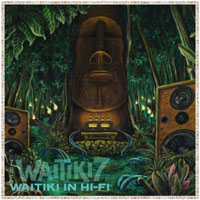World in Stereo examines classic and modern world music while striving for a greater appreciation of other cultures.
 The Waitiki 7: Waitiki in Hi-Fi (Pass Out, 4/12/11)
The Waitiki 7: Waitiki in Hi-Fi (Pass Out, 4/12/11)
The Waitiki 7: “Ouanalao”
[audio:https://alarm-magazine.com/wp-content/uploads/2011/04/06-Ouanalao.mp3|titles=Waitiki 7: “Ouanalao”]When Dwight Eisenhower signed the bill admitting Hawaii into statehood in 1959, Americans were living in a post-WWII United States, ready to forget and eagerly optimistic to start anew. Though a standard history book will tell you that everyone was consumer-crazy and making a lot of babies, it won’t tell you that a large percentage of the populace was listening to exotica.
Borne out of Hawaii’s post-war music scene, exotica is marked by its lounge-like feel, a tropical summation of Pacific, Caribbean, and Latin sounds fused with American pop and jazz. As a precursor to the modern world-music movement, artists like Martin Denny and Les Baxter introduced stateside audiences to new sounds and rhythms. By the 1970s, exotica was snooze-worthy, stock-heavy pop, but a listen to the golden-era recordings exposes some groove-heavy material with plenty of progressive rhythms and dreamy, vibraphone-drenched melodies.
Fortunately, Oahu-based The Waitiki 7 has managed to steer clear from contrived kitsch to bring modern sensibility to exotica’s late-’50s to mid-’60s pinnacle sound. As heard on its 2009 debut, Adventures in Paradise, and on the 2010 follow-up, New Sounds of Exotica, the septet builds on Latin-jazz foundations with an ear for vintage and retro qualities. Now the band is releasing a set of alternative studio takes from both records with Waitiki in Hi-Fi, a vinyl-only release that will have you dusting off that vintage Crosley record player.
If there’s one thing that you should know about The W7 and exotica as a whole, it’s that myriad instruments are always at play: the ever-so-important vibraphone and xylophone, piano, reed and brass instruments, and enough exotic bird calls to make you think that you’ve just stepped into an aviary. As important as rum is to the mai tai, so are jungle-animal sounds to exotica. The W7’s Lopaka Colon is responsible for these sounds, which help to create the tropical mood that the music ultimately celebrates. The technique, best heard on the live version of Denny’s groundbreaking hit, “Quiet Village,” is kept to a classy minimum throughout.
“Simalau,” first released on New Sounds of Exotica, sees an excellent remix from Tabuzak (a.k.a. Jack Fetterman). The song is stripped down to its bare bones, with the half of the original animal calls taken out. Outfitted with expanded solo parts, and a focus on the piano-bass groove and the different percussion elements, the remix re-imagines the song as a jazz tune.
Beyond the rich tones and fluttering reed instruments, the record stands as an homage to vinyl itself. Because vinyl has experienced a continued resurgence over the past few years, Waitiki in Hi-Fi is for exotica lovers and vinyl users alike. The vinyl-only release looks back to a time in the 1950s when records were a piece of art, connecting today’s nostalgia-loving audiences to the era’s music. Playing such robust, warm tones, it makes total sense for The W7 to carve out its new grooves in vinyl format, and Waitiki in Hi-Fi is a welcome edition to any collection.

